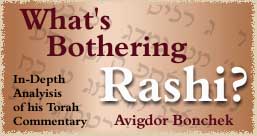

Back to this week's Parsha | Previous Issues
Parashas Chukas
Last week (Parashas Korach) we asked on the Rashi in Numbers 17:23 "And it came to pass, on the morrow, that Moses came into the Tent of Testimony, and behold the staff of Aaron, of the house of Levi, blossomed, (Hebrew: "parach") yielded a flower ("perach") and brought forth buds and bloomed blossoms and ripened into almonds."
RASHI
What has Rashi told us? Of course we would take it literally, even if he said nothing. Why did he need to comment? An Answer: The word "Perach" is used twice in these verses. The first time (our verse) it means "Blossomed." This is the literal meaning, it includes the whole process of blossoming - the blossoming of the flower, the sprouting of the bud of the almond and then the ripening of the almonds. Rashi's comment, apparently unnecessary, tells us to differentiate between "parach" and the later term "perach." We should not think this word means "to produce a flower" because if it did, then the later mention ("vayotzei perach") would be redundant. Rather it means, literally "it blossomed." Thus Rashi's comment. Now to This week's sedra Parashas Chukas.
Rashi on verse 20:15.
RASHI A Question: What is Rashi telling us that we wouldn't know from the verse itself? What is his point? Your Answer: An answer next week, IY'H.
Back to this week's Parsha | Previous Issues
|